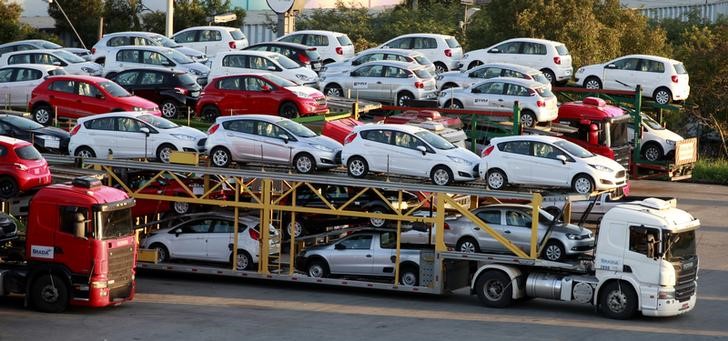By David Shepardson and Jeff Mason
May 24 (Reuters) - A U.S. threat that it may introduce tariffs on foreign auto imports drew strong criticism on Thursday from the country's main business lobbying group, which warned of a "staggering" blow to the industry and the prospect of a global trade war.
President Donald Trump's administration opened a trade investigation on Wednesday into whether vehicle imports had damaged the American auto industry. That could lead to tariffs of up to 25 percent on the same "national security" grounds used to impose U.S. steel and aluminum duties in March. Commerce Secretary Wilbur Ross said on Thursday the investigation was still in its early stages but that other countries' high, artificial barriers, such as tariffs and other interventions, have skewed the marketplace.
"Now it's very difficult to get back to a reciprocal arrangement," Ross said in an interview on CNBC, a day after announcing the probe, which could lead to new U.S. tariffs on imported vehicles.
The probe, launched under Section 232 of the Trade Expansion Act of 1962, will look at whether vehicle and parts imports are threatening the industry's health and ability to research and develop advanced technologies, Ross said on Wednesday.
The U.S. Chamber of Commerce said it strongly opposes the move.
"If this proposal is carried out, it would deal a staggering blow to the very industry it purports to protect and would threaten to ignite a global trade war," chamber President and Chief Executive Officer Thomas Donohue said in a statement. He urged the government to reverse course.
Canadian Prime Minister Justin Trudeau said the U.S. move was based on flimsy logic and clearly linked to talks to modernize the North American Free Trade Agreement (NAFTA). NAFTA partner Canada is the largest exporter of auto products to the United States. DIHK Chambers of Industries and Commerce dismissed as farfetched the national security justification for a probe. "We almost have to take this as a provocation," DIHK President Eric Schweitzer said.
Together German carmakers BMW BMWG.DE , Daimler AG DAIGn.DE and Volkswagen AG control more than 90 percent of the North American premium auto market.
Tariffs would hit Germany particularly hard and shave 0.16 percent off the economic output of Europe's largest economy, the influential Ifo think tank said. "No other country has higher absolute losses to fear than Germany," said Gabriel Felbermayr, foreign trade expert at Ifo.
German Finance Minister Olaf Scholz said the European Union should be united in its response to the threat of U.S. tariffs.
The probe comes ahead of midterm elections in the United States in November that will determine whether Republican President Donald Trump's party retains control of Congress. It is seen as part of Trump's "America First" promise to win back manufacturing jobs lost to overseas competitors.
United Auto Workers President Dennis Williams said he supports Trump's trade policies and his efforts to protect American workers from competition from low-wage countries.
But that did not mean the UAW was ready to support Republicans running for Congress in the midterms. "The Republican Congress and Senate, they have totally ignored the needs of working men and women in this country," Williams said.
U.S. Senate Finance Committee Chairman Orrin Hatch said possible auto tariffs are "deeply misguided," and urged the administration "to remain focused on addressing China's trade practices." to a mixed bag of effects on U.S. producers after the metals tariffs, analysts were cautious about predicting major gains for U.S. companies and workers from the process.
"Measures like this are ultimately about protecting American manufacturing jobs in states that voted for Trump rather than national security," Morningstar analyst David Whiston said in a note.
"We don't see these tariffs (if proposed) lasting forever and we think (they) will ultimately cost American jobs."
Shares of General Motors Co (NYSE:GM) GM.N rose 1.5 percent and Ford Motor (NYSE:F) Co F.N was up 1.7 percent in early afternoon trading.
In Europe, BMW BMWG.DE and Daimler DAIGn.DE shares dropped as much as 3.5 percent during the session, while Volkswagen AG VOWG_p.DE closed down 2.5 percent. Together the three automakers control more than 90 percent of the North American premium auto market.
Renault SA RENA.PA , exposed to the U.S. market via its 43.4 percent stake in Nissan, fell as much as 2.1 percent. Europe's auto sector index .SXAP lost 2 percent and was on track for its worst day in 10 months.
Higher tariffs could be particularly painful for Asian automakers, including Toyota Motor Corp 7203.T , Nissan Motor Co 7201.T , Honda Motor Co 7267.T and Hyundai Motor Co 005380.KS , which count the United States as a key market. The probe sparked a broad sell-off in automakers' shares across the region. MKTS/GLOB
Toyota dropped 3 percent and Honda slid 3.4 percent.
Toyota, which has 10 U.S. plants and 1,500 U.S. dealers, said in a statement that any tariffs "could hurt American jobs" and raise costs for consumers.
The governments of Japan, China and South Korea said they will monitor the situation, while Beijing, which is increasingly eyeing the United States as a potential market for its cars, added that it would defend its interests.
In addition to tariffs, Commerce Secretary Ross cited other non-tariff barriers such as standards, licensing and "all kinds of other games."
"The stupidity is that we let ourselves get into this box of extremely low rates," he told CNBC.
The United States imported 8.3 million vehicles in 2017 worth $192 billion, including 2.4 million from Mexico, 1.8 million from Canada, 1.7 million from Japan, 930,000 from South Korea and 500,000 from Germany, according to U.S. government statistics.
At the same time, the United States exported nearly 2 million vehicles worldwide worth $57 billion.
<^^^^^^^^^^^^^^^^^^^^^^^^^^^^^^^^^^^^^^^^^^^^^^^^^^^^^^^^^^^ BREAKINGVIEWS-Autos investors too quick to call Trump's bluff
ID:nL8N1SB1QD U.S. auto import probe borders on "provocation" - Germany's DIHK
ID:nL5N1SV2KY BREAKINGVIEWS-U.S. threatens autos with scorched-earth gambit
